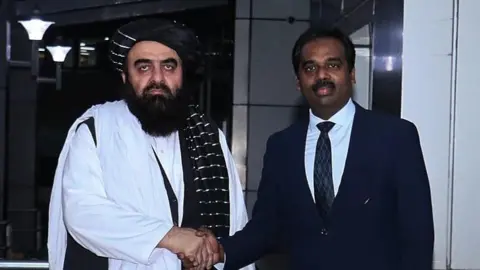Dawood AzamiBBC World Service and
Cherylann MollanMumbai
 Randhir Jaiswal/MEA Twitter
Randhir Jaiswal/MEA TwitterAfghan Taliban Foreign Minister Amir Khan Muttaqi has arrived in India for a week of talks – a visit which had been previously unimaginable.
It is the Taliban’s highest-level visit to the country since seizing power in 2021, and Muttaqi is due to discuss diplomatic, trade and economic ties with India’s Foreign Minister S Jaishankar and other officials during an eight-day stay.
The visit is being seen as a ramping up of India’s Afghan policy. Arch-rival Pakistan, which historically had close ties with the Taliban, will be watching closely.
Muttaqi – who was granted a temporary exemption from UN sanctions allowing him to travel – flew into Delhi from Russia, the only country so far to fully recognise the Taliban government.
The astonishing fact is that neither Islamabad, Delhi or the Taliban could have anticipated that so soon after taking power, the Taliban’s relations with Pakistan would deteriorate to such a degree, while India would establish a multilateral relationship with the new government in Kabul.
Delhi used to support the Western-backed Afghan government, which the Taliban drove from power, and this visit illustrates pragmatism and realpolitik on both sides, indicating they are serious about upgrading diplomatic, political and trade links.
Muttaqi, accompanied by Afghan trade and foreign ministry officials, is scheduled to hold talks with India’s Jaishankar in Delhi on Friday. The Afghan delegation will also meet representatives of the Indian business community.
“We look forward to engaging discussions with him on bilateral relations and regional issues,” a spokesperson from India’s foreign ministry said.
Meanwhile, a Taliban spokesman told the BBC that Muttaqi would meet India’s foreign minister and other officials “to discuss various political, economic, and trade [issues], and improving of ties of Afghanistan and the region”.
Building understanding between unlikely allies
Although India has not formally recognised Afghanistan’s de facto rulers, it is one of a number of countries that maintain some form of diplomatic or informal relations with the Taliban. India has a small mission in Kabul, and sends humanitarian aid to Afghanistan, one of the poorest countries in the world.
The growing engagement between India’s right-wing Hindu nationalist government and the Islamist Taliban started not long after the group’s return to power in Kabul.
This particular trip comes against a backdrop of worsening ties between both India and Pakistan, and Pakistan and the Taliban government.
“The deterioration in ties with Pakistan also allows them [Taliban] to hedge their bets and show how it is no longer dependent on Islamabad for its survival – carving out an identity separate from their over-dependence on Pakistan,” Harsh V Pant and Shivam Shekhawat, of the Observer Research Foundation think tank, wrote in a piece for NDTV news channel.
Deeper engagement with India also gives the group a chance to “create a perception of legitimacy for their domestic constituents”, according to Mr Pant and Mr Shekhawat.
The visit “represents a setback for Pakistan” and marks a significant step towards the Taliban regime’s de facto recognition, said Brahma Chellaney, a strategic affairs analyst on X.
It signals “a cautious reset in India-Taliban relations, with both sides prioritising pragmatic engagement to advance their strategic interests”, Chellaney added, saying the visit also marks a possible shift in Afghanistan’s regional power dynamics.
Just more than four years ago, all this seemed unlikely.
After a timeline was set for US-led forces to withdraw by mid-2021, panic prevailed in Indian policy circles. As the Taliban captured Kabul on 15 August 2021, India shut its embassy and four consulates in Afghanistan and stopped issuing visas to Afghans from all walks of life, including students, patients, traders and former government officials and politicians.
With just one click it cancelled nearly all the visas it had already issued to thousands of Afghans, allegedly due to security concerns.
But within a year India had re-established its diplomatic presence, sending a “technical team” to Afghanistan in June 2022, tasked with overseeing the distribution of humanitarian aid.
Delhi also started issuing visas to influential Taliban figures, government officials and their family members. Such visits, though not announced officially, helped build trust and understanding.
Last November, India allowed the Taliban to appoint an envoy in Delhi and to open consulates first in Mumbai, then a few months later in Hyderabad.
Over the past three years, the two countries have been working on gradually rebuilding ties, with Indian officials and diplomats holding several high-level engagements abroad, including a meeting between Muttaqi and India’s Foreign Secretary Vikram Misri in Dubai in January this year.
A battle for influence
India and Pakistan have long been engaged in a zero-sum game in Afghanistan, with each vying to dominate its political landscape at the expense of the other.
Due to the Taliban’s close ties with Pakistan, the Indian military and political establishment had viewed the group since its foundation in 1994 as a Pakistani proxy aiming to evict India from Afghanistan.
India, along with Russia and Iran, supported factions fighting against the Taliban in Afghanistan until the group was removed from power after the 2001 US invasion.
For the next 20 years, India remained a major supporter of the US-backed, internationally-recognised Afghan government as insurgents, mainly the Taliban, waged an increasingly bloody war.
While Pakistan enjoyed good relations with the Taliban during the group’s first rule (1996-2001) and the beginning of their second period in power, relations between the two have become increasingly strained.
So much so that various Pakistani officials including its defence minister have publicly called Afghanistan an “enemy country”. Pakistan accuses the Taliban government of allowing the Pakistani Taliban (TTP) to use Afghan territory to launch attacks inside Pakistan, and has carried out air strikes inside Afghanistan against what it calls TTP sanctuaries.
India’s reasons for maintaining good relations with the Taliban are first and foremost about advancing its national interest.
Delhi’s biggest concern is security, and especially the activities of the Islamic State group, al-Qaeda and other India-focused militant outfits. The Taliban have assured Delhi they will not allow Afghan territory to be used for terrorist activity against India.
Ties with the Taliban are also key to Delhi’s desire to deepen connectivity with Iran and Central Asia to counter China and Pakistan’s influence in the region.
Despite deepening ties between India and the Taliban government, both sides are cautious. Their relationship remains tactical due to reservations over what happened in the past, as well as various domestic considerations and possible foreign repercussions.



